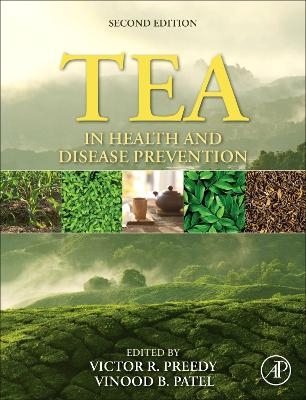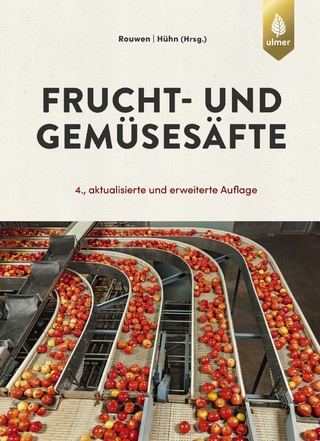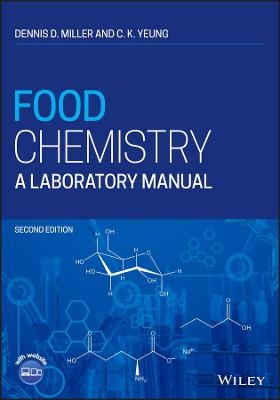
Tea in Health and Disease Prevention
Academic Press Inc (Verlag)
978-0-443-14158-4 (ISBN)
Tea in Health and Disease Prevention, Second Edition, is an organized, efficient resource that will help readers find quick answers to questions and will help inspire further studies for those interested in tea research. This is a must-have reference for researchers in food science and nutrition, as well as nutritionists and dieticians.
Victor R. Preedy BSc, PhD, DSc, FRSB, FRSPH, FRSC, FRCPath graduated with an Honours Degree in Biology and Physiology with Pharmacology. After gaining his University of London PhD, he received his Membership of the Royal College of Pathologists. He was later awarded his second doctorate (DSc), for his contribution to protein metabolism in health and disease. He is Professor of Clinical Biochemistry (Hon) at King’s College Hospital and Emeritus Professor of Nutritional Biochemistry at King’s College London. He has Honorary Professorships at the University of Hull, and the University of Suffolk. Professor Preedy was the Founding Director and then long-term Director of the Genomics Centre at King’s College London from 2006 to 2020. Professor Preedy has been awarded fellowships of the Royal Society of Biology, the Royal College of Pathologists, the Royal Society for the Promotion of Health, the Royal Institute of Public Health, the Royal Society for Public Health, the Royal Society of Chemistry and the Royal Society of Medicine. He carried out research when attached to the National Heart Hospital (part of Imperial College London), The School of Pharmacy (now part of University College London) and the MRC Centre at Northwick Park Hospital. He has collaborated with international research groups in Finland, Japan, Australia, USA, and Germany. To his credit, Professor Preedy has published over 750 articles, which includes peer-reviewed manuscripts based on original research, abstracts and symposium presentations, reviews and edited books. Vinood B. Patel, BSc, PhD, FRSC, is currently Professor in Clinical Biochemistry at the University of Westminster. In 2014 Dr Patel was elected as a Fellow to The Royal Society of Chemistry. Dr Patel graduated from the University of Portsmouth with a degree in Pharmacology and completed his PhD in protein metabolism from King’s College London in 1997. His postdoctoral work was carried out at Wake Forest University Baptist Medical School, NC, USA studying structural-functional alterations to mitochondrial ribosomes, where he developed novel techniques to characterize their biophysical properties. Research is being undertaken to study the role of nutrients, antioxidants, phytochemicals, iron, alcohol and fatty acids in the pathophysiology of liver disease. Other areas of interest are identifying new biomarkers that can be used for the diagnosis and prognosis of disease and understanding mitochondrial oxidative stress in neurological disorders and iron dysregulation in diabetes. Dr Patel is a nationally and internationally recognized researcher and has several edited biomedical books related to the use or investigation of active agents or components. These books include The Handbook of Nutrition, Diet, and Epigenetics, Branched Chain Amino Acids in Clinical Nutrition, Cancer: Oxidative Stress and Dietary Antioxidants, Toxicology: Oxidative Stress and Dietary Antioxidants, Molecular Nutrition: Vitamins, The Neuroscience of Pain, Cognitive Behavioural Therapy. He is Editor of the ten-volume series Biomarkers in Disease: Methods, Discoveries and Applications.
Section I: Tea, tea drinking, and varieties
1. The tea plants: Botanical aspects
Diganta Deka, Dharitri Sarmah, Harisadhan Malakar, Sentimenla, Ranjit Kumar Paul, Md Yeasin, Animesh Sarkar, C.S. Maiti and Tanmoy Karak
2. Black tea: Manufacturing and composition
Podma Pollov Sarmah, Himangshu Deka, Santanu Sabhapondit, Pritom Chowdhury, Kaberi Rajkhowa and Tanmoy Karak
3. Green tea: Plants, artisanal knowledge, processing, manufacturing and production
Selena Ahmed and John Richard Stepp
4. White tea: The plants, processing, manufacturing, chemical compositions, and potential health benefits
Qing-Yi Lu, Zuo-Feng Zhang and Jenny T. Mao
5. Pu-erh tea: Botany, ethnobotany, production, and chemistry
Selena Ahmed and John Richard Stepp
6. Mate tea: Manufacture and composition
Mariana Mesquita
7. Compositional and nutritional aspects: Kombucha-type fermented teas
Karolina Jakubczyk, Klaudia Melkis, Alicja Ligenza and Katarzyna Janda-Milczarek
8. Oolong tea: The plants, processing, manufacturing, and production
Po-An Chen and Shu-Yen Lin
9. Exploring the world of herbal teas
Diego Rivera and Concepción Obón
Section II: Production, processing, and preparation
10. Advances in the processing of tea extracts: Emerging sustainable technologies
Francisco Díaz, Ricardo Ferreira, Beatriz Piñeiro-Lago, Susana M. Cardoso, M. Dolores Torres and
Herminia Domínguez
11. The effect of tea brewing time on chemical content and biological activity
Kasim Takim and Mehmet Emin Aydemir
12. Tea processing and impact on catechins, theaflavin and thearubigin formation
Alfred Anakalo Shitandi
Section III: Compositional and nutritional aspects
13. Compounds found in tea, their concentrations, and methods of analysis
Dhanya B. Sen, Rajesh A. Maheshwari, Aarti Zanwar, K.P. Greeshma and Ashim Kumar Sen
14. Infusion times and temperature on the composition of tea beverages Ozan Kahraman, Türkan Uzlaşır, Gamze Güçlü, Serkan Selli and Hasim Kelebek
15. Adulterants in tea
Jibu Thomas, Nivethitha Leelakrishnan, Tanujaa Ravindran and Levin Anbu Gomez
16. How the health-benefit components of tea vary depending on the cultivar and season: The example of Darjeeling tea
Anjan Hazra and Sauren Das
17. Fluoride and teas consumption: A balanced synopsis
Lídia Audrey Rocha Valadas, Constanza E. Fernández, Vanara Florêncio Passos and Aldo Squassi
18. Copper, iron and zinc content in tea and their nutritional aspects on human health
Himangshu Deka, Tupu Barman and Podma Pollov Sarmah
19. Heavy metals in teas and their health implications
Burhan Basaran and Özlem Saral
20. Tea as a dietary antioxidant: Contribution to total antioxidant capacity
Alessandra da Silva, Gabriela Amorim Pereira Sol, Dandara Baia Bonifácio, Josefina Bressan and Andréia Queiroz Ribeiro
21. Tea and food antioxidant interactions: Investigating antagonism and synergism
Ezgi Doğan Cömert, Ecem Evrim Çelik and Vural Gökmen
22. Matcha tea: and its antioxidant profile and effects
Karolina Jakubczyk, Joanna Kika, Kinga Szymczykowska and Katarzyna Janda
23. Tea, energy metabolism, and the satiety responses
Natália Cristina de Faria, Ana Paula da Costa Soares, Victor R. Preedy and Lucilene Rezende Anastácio
Section IV: General aspects of the effects of tea
A: Body, organs, and tissues
24. Tea consumption and body fat distribution
Chao Cao, Ruixuan Wang and Lin Yang
25. Revising the potential role of black tea in alleviating metabolic syndrome
Ritwija Bhattacharya, Dishari Dasgupta, Manabi Paul, Aniruddha Mukhopadhyay and Pritha Bhattacharjee
26. The effect of kombucha tea on liver functions: A review of accumulated evidence
Shahira M. Ezzat, Engy A. Mahrous and Essam Abdel-Sattar
27. Tea and the gut microbiota
Abbe Maleyki Mhd Jalil and Christine Ann Edwards
28. Evaluation of antiosteoporosis effects of Camellia sinensis (tea), its extracts, and major compounds
Chirag Kulkarni, Sreyanko Sadhukhan and Naibedya Chattopadhyay
29. Potential clinical application of green tea therapy in ocular protection
Kai On Chu, Chi Chiu Wang and Chi Pui Pang
30. Potential benefits of tea consumption against risk factors associated with the development of coronary artery disease
Yonela Ntamo, Duduzile Ndwandwe, Bongani B. Nkambule, Marakiya T. Moetlediwa, Asanda Mayeye, Nomahlubi Luphondo, Ndivhuwo Muvhulawa, Musawenkosi Ndlovu, Sihle E. Mabhida, Sithandiwe E. Mazibuko-Mbeje, Nokulunga Hlengwa, Sidney Hanser, Jeanine L. Marnewick, Patrick Orlando, Luca Tiano and Phiwayinkosi V. Dludla
31. Linking exercise and green tea consumption as an antioxidant strategy
Hadi Nobari and Saber Saedmocheshi
32. Bioinformatics applications for evaluating health and pharmacological properties of tea: Use of
computer-assisted drug discovery tools
Anish Mathew Chacko, Yatheesharadhya Bylappa and Anish Nag
B: Cellular and nonorgan effects
33. Sunscreen from tea
Setyo Nurwaini and Wahyu Utami
34. Tea and kidney stone formation
Roswitha Siener
35. Tea and cancer risk
Dwina Juliana Warman and Huijuan Jia
36. Molecular aspects of the effects of green tea extracts in cancer studies
Mana Alavi and Fatemeh Safari
37. Epigenetic factors of green tea consumption in cancer prevention
László Szabó, Ferenc Budán, Dávid Szép, Zoltán Gyöngyi, Bence L. Raposa and
István Kiss
38. The potential for black tea in combating arsenic toxicity
Madhumita Roy, Archismaan Ghosh and Amitava Datta
39. Tea extract and usage against multidrug-resistant bacteria
Abhishek Mehta and Mahendra Pratap Mehta
40. Tea and its antibacterial effects compared to other plants
Aparna Shil, Sudipta Majhi, Sima Sikdar, Prerona Biswas and Mausumi Sikdar (née Bhakta)
Section V: Focused areas, specific tea components, and effects on tissue and organ systems
41. Epigallocatechin-3-gallate effects on leukemia cells
Maliheh Moradzadeh
42. Tea epigallocatechin gallate and impact on life span
Rohit Sharma
43. Epigallocatechin gallate and its antifungal profiles
Dwi Murtiastutik, Lunardi Bintanjoyo and Yusuf Wibisono
44. Unraveling molecular and cellular mechanisms underlying the beneficial effects of epigallocatechin-3-gallate by proteomic investigations
Sunisa Yoodee and Visith Thongboonkerd
45. Autophagy and green tea epigallocatechin-3-gallate: Applications to female reproductive
cancers
Gene Chi-Wai Man, Loucia Kit-Ying Chan, Sze Wan Hung, Yi Song, Lu Chen, Tao Zhang and Chi Chiu Wang
46. Green tea epigallocatechin gallate and its impact on heart health
Yuejin Li
47. Epigallocatechin gallate (EGCG) and its derivative: In silico reverse screening and molecular docking for therapeutics
Sze Wan Hung, Chi Wai Gene Man and Chi Chiu Wang
48. Molecular effects of green tea epigallocatechin gallate on the microRNA-143/MAPK7 and microRNA-let-7a/HMGA2 pathways
Hui-Chen Ku, Chih-Chun Kuo, Tsung-Chen Su, Meei-Ju Yang, Ching-Feng Cheng and Yung-Hsi Kao
49. Pharmacology of caffeine: Implications of tea drinking
Rajesh A. Maheshwari, Dhanya B. Sen, Umang H. Shah, Aman Upaganlawar and Ashim Kumar Sen
50. Caffeine and its potential use in Parkinson’s disease
Angshuman Bagchi and Sima Biswas
51. Catechin: Features and linking effects on caffeine and mast cells
Itsuro Kazama
52. Green tea catechins and physical activity: Exploring their role in prostate cancer studies
Hadi Nobari, Saber Saedmocheshi and Alberto Pérez-López
53. Potential of tea-derived phytoconstituents against Candida albicans and C. glabrata infection
Jigisha Anand, Shubhangee Agarwal, Pavita Thapa, Maitri Gupta, Rakesh Kumar Bachheti and Nishant Rai
54. Theaflavins in tea: Features and effects
Ashim Kumar Sen, Rajesh A. Maheshwari, Faruk Alam, Rajesh L. Dumpala, Umang H. Shah and Dhanya B. Sen
55. Theaflavin-enriched black tea: Uses and applications
Dhrubajyoti Sarkar, Ushasi Das and Sohini Chatterjee
56. Theanine (L-glutamylethylamide) in tea and its protective effects against bladder dysfunction
Kanako Matsuoka, Hidenori Akaihata, Junya Hata, Ryo Tanji, Soichiro Ogawa and Yoshiyuki Kojima
57. Computational studies to explore tea catechins and theaflavins as drug candidates
Susmit Mhatre and Vandana Patravale
58. Oolonghomobisflavans in oolong tea and lifespan effects
Chatrawee Duangjan and Sean P. Curran
Section VI: Behavior, brain, and neurological systems
59. Tea consumption and depression
Mustafa Volkan Yılmaz, Esma Asil and Aslı Uçar
60. Tea drinking and reduction of anxiety
Mohammad Bakhriansyah
61. Theanine and amelioration of brain stress
Keiko Unno
62. Theanine (L-gamma-glutamylethylamide) in green tea, and its impact on cognitive function
Yoshitake Baba
63. Theanine (L-gamma-glutamylethylamide) in tea: Effects on attention and underlying
neurophysiology
Tharaka L. Dassanayake
64. Green tea prevents apoptosis in stroke
Abdulloh Machin, Savira Butsainah Dienanta and Mary Dan
65. Caffeine and beneficial cognitive effects
Joana A. Loureiro, Stéphanie Andrade, Maria João Ramalho and Maria Carmo Pereira
66. Tea catechins and visual motion processing
Yuko Sugita
67. Green tea and health outcomes including cardiovascular disease, cancer, and dementia
Masayuki Teramoto, Ehab S. Eshak and Hiroyasu Iso
Section VII: Adverse effects and contaminants of tea and tea-related products
68. Toxicity of tea polyphenols
Dennis P. Cladis
69. Arsenic and chromium in teas
Harisadhan Malakar, Jintu Dutta, Animesh Sarkar, Diganta Deka, Jurisandhya Bordoloi, Ranjit Kumar Paul, Md Yeasin, C.S. Maiti, Sukanya Baruah, Jiban Saikia and Tanmoy Karak
70. Anthraquinones in tea and implications for toxicology
Rosario Zamora and Francisco J. Hidalgo
71. Clinical evidence of tea—drug interactions
Shingen Misaka and Kenju Shimomura
72. Glyphosate in tea as a potentially toxic compound
Thanh Dam Nguyen, Manh Huy Nguyen, Minh Tam Thi Nguyen, Hong Anh Duong and Hung Viet Pham
73. Microplastic pollution in tea: What do we know?
Farah Noshin Chowdhury and Md Mostafizur Rahman
Section VIII: Applications of byproducts, selective methods, and resources
74. Usage of spent tea leaves: A new narrative
Narashans Alok Sagar, Meenakshi Pathak, Ramveer Singh, Eng-Keng Seow, Ajay V. Chinchkar and Manik Sharma
75. Utilization and profiles of spent black tea: Extraction techniques and
microencapsulation
Surakshi Rajapaksha and Naoto Shimizu
76. Advanced analytical techniques for bioactive compounds in tea
Yunle Huang, Rui Min Vivian Goh, Aileen Pua, Lionel Jublot, Shao Quan Liu, Bin Yu and Dejian Huang
77. Catechins in tea and methods for their detection
Irina Georgiana Munteanu and Constantin Apetrei
78. Methods and technologies for the analysis of caffeine in tea
Nayomi Dave, Pranav Sonawane, Tanu Dixit, Asmita Pramanic and Selvan Ravindran
79. Pesticides in teas: Methods of analysis
Kasim Takım and Mehmet Emin Aydemir
80. Carotenoids in tea
Xin-Qiang Zheng, Xiao-Xiang Li, Na-Na Li, Jian-Liang Lu, Victor R. Preedy, Jian-Hui Ye and Yue-Rong Liang
81. Contamination level of polycyclic aromatic hydrocarbons in tea and tea infusion: Analytical methods and risk assessment
Thuy Ngoc Nguyen, Thanh Dam Nguyen, Hung Viet Pham and Hong Anh Duong
82. Recommended resources for tea in health and disease prevention
Rajkumar Rajendram, Vinood B. Patel and Victor R. Preedy
| Erscheinungsdatum | 24.09.2024 |
|---|---|
| Verlagsort | San Diego |
| Sprache | englisch |
| Maße | 216 x 276 mm |
| Gewicht | 2980 g |
| Themenwelt | Technik ► Lebensmitteltechnologie |
| ISBN-10 | 0-443-14158-4 / 0443141584 |
| ISBN-13 | 978-0-443-14158-4 / 9780443141584 |
| Zustand | Neuware |
| Informationen gemäß Produktsicherheitsverordnung (GPSR) | |
| Haben Sie eine Frage zum Produkt? |
aus dem Bereich


